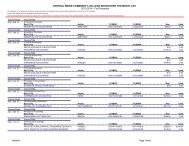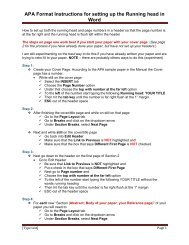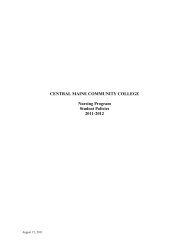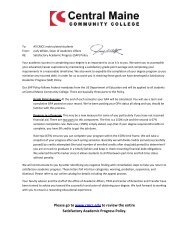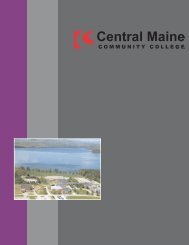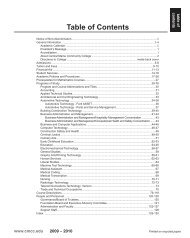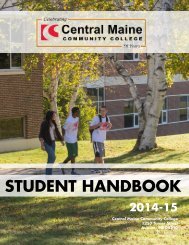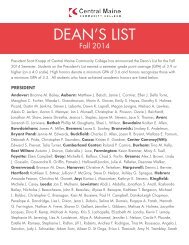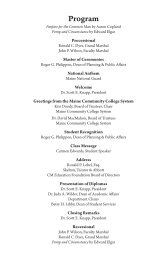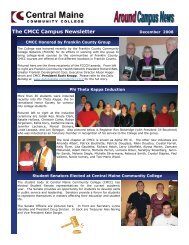Academic Policies and Procedures - Central Maine Community ...
Academic Policies and Procedures - Central Maine Community ...
Academic Policies and Procedures - Central Maine Community ...
You also want an ePaper? Increase the reach of your titles
YUMPU automatically turns print PDFs into web optimized ePapers that Google loves.
course<br />
descriptions<br />
Course Descriptions<br />
PMT 221 Advanced Turning Processes<br />
2 Credits (.5 Lecture 1 Lab .5 Shop)<br />
4 Hrs/Wk (.5 Hr. Lecture 2 Hrs. Lab 1.5 Hrs.<br />
Shop) *15 wks<br />
This course covers the machinability of metals,<br />
carbide identifi cation systems, speeds <strong>and</strong><br />
feeds for carbide tooling <strong>and</strong> silver soldering of<br />
carbide tooling. Metric threading <strong>and</strong> eccentric<br />
turning will be demonstrated by the students.<br />
Prerequi site: PMT 211 or instructor permission.<br />
PMT 222 Advanced Milling Processes<br />
2 Credits (.5 Lecture 1 Lab .5 Shop)<br />
4 Hrs/Wk (.5 Hr. Lecture 2 Hrs. Lab 1.5 Hrs.<br />
Shop) *15 wks<br />
Advanced milling machining processes are covered<br />
in this course including angular, contour,<br />
<strong>and</strong> slotting operations. Precision reaming operations<br />
with hole tolerances of + .001 of an<br />
inch will be performed. Parts will be machined<br />
square to a tolerance of .003 over a two inch<br />
surface <strong>and</strong> parallel within .002 of an inch. Hole<br />
to hole locations will be machined with a tolerance<br />
of + .005 of an inch. Holes will be bored<br />
using the offset boring head to a tolerance of +<br />
.001 of an inch. The student will cut gears using<br />
both direct <strong>and</strong> simple indexing to perform this<br />
task. Each student will produce a NIMS level 1<br />
vertical milling part <strong>and</strong> if successful will do the<br />
online test to earn a NIMS credential. Prerequisite:<br />
PMT 212 or instructor permission.<br />
PMT 227 Advanced Toolmaking Techniques<br />
2 Credits (.5 Lecture 1 Lab .5 Shop)<br />
4 Hrs/Wk (.5 Hr. Lecture 2 Hrs. Lab 1.5 Hrs.<br />
Shop) *15 wks<br />
This course will exp<strong>and</strong> upon the toolmak ing<br />
skills acquired in PMT 217 Introduction to Toolmaking.<br />
More in depth instruction on the function<br />
<strong>and</strong> construction of jigs, fix tures <strong>and</strong> dies<br />
will be covered along with the study of plastic<br />
injection molds. Pre requisite: PMT 217 or instructor<br />
permission.<br />
PMT 228 Metallurgy<br />
1 Credit (1 Lecture 0 Lab 0 Shop)<br />
1 Hr/Wk (1 Lecture) *15 wks<br />
This course develops familiarization with the<br />
various ferrous <strong>and</strong> non-ferrous metals used in<br />
the machine tool industry. Various methods of<br />
heat treatment of tool steel will be discussed.<br />
The use of alternative mate rials such as lightweight<br />
carbon fi ber <strong>and</strong> plastics will also be<br />
taught.<br />
PMT 229 Advanced CNC Part II<br />
2 Credits (.5 Lecture 1 Lab .5 Shop)<br />
4 Hrs/Wk (.5 Hr. Lecture 2 Hrs. Lab 1.5 Hrs.<br />
Shop) *15 wks<br />
This course is a continuation of the PMT 214<br />
class. Students will continue building there<br />
skill set using Master Cam by programming<br />
more complex parts. Students will continue to<br />
build upon there skill set with the set-up <strong>and</strong><br />
running on CNC machines with more complex<br />
parts <strong>and</strong> work holding techniques. An emphasis<br />
on reduced set-up times <strong>and</strong> more efficient<br />
machining times will be introduced. Students<br />
will have one instructor led project that will require<br />
working in small groups. Outside of this<br />
project students will have to program <strong>and</strong> run<br />
a minimum of one CNC Milling part as well as<br />
one CNC Lathe part. These projects can be<br />
chosen by the students with faculty approval, or<br />
the instructor can assign projects if necessary.<br />
Prerequisite: PMT 115, 117, 124, <strong>and</strong> 214 or<br />
instructor permission.<br />
Psychology (PSY)<br />
PSY 101 Introduction to Psychology<br />
3 Credits (3 Lecture 0 Lab 0 Shop)<br />
3 Hrs/Wk (3 Hrs. Lecture) *15 wks<br />
This course is an introduction to the study of<br />
human behavior <strong>and</strong> its application to everyday<br />
life situations. Among the topics discussed are<br />
physiological foundations of behavior, altered<br />
states of consciousness, emotion, learning, <strong>and</strong><br />
thinking. Using these topics as a basis for discussion,<br />
students will further explore the following<br />
topics: per sonality, interpersonal communication,<br />
con flict, group processes, behavior disorders <strong>and</strong><br />
therapies, <strong>and</strong> industrial psychology.<br />
PSY 111 Developmental Psychology<br />
3 Credits (3 Lecture 0 Lab 0 Shop)<br />
3 Hrs/Wk (3 Hrs. Lecture) *15 wks<br />
This course is a multi-disciplinary study of life<br />
span development from prenatal <strong>and</strong> postnatal<br />
stages through infancy, child hood, adolescence,<br />
adulthood, old age, <strong>and</strong> death. Included will be<br />
discussions of genetic, environmental, psychological,<br />
<strong>and</strong> sociological influences of the development<br />
of <strong>and</strong> changes in physical, cognitive<br />
<strong>and</strong> language, <strong>and</strong> psychosocial domains of<br />
individuals.<br />
PSY 114 Child Development<br />
3 Credits (3 Lecture 0 Lab 0 Shop)<br />
3 Hrs/Wk (3 Hrs. Lecture) *15 wks<br />
Development of the young child, from con ception<br />
to pre-adolescence, will be studied through presentation<br />
of theory, observation of children, <strong>and</strong><br />
review of the current research. This will provide<br />
a holistic con tent for underst<strong>and</strong>ing the many<br />
variables that influence the on-going growth <strong>and</strong><br />
development of young children. This course will<br />
also provide the basis for creat ing developmentally<br />
appropriate curriculum for children birth<br />
through age eight years.<br />
PSY 116 Psychology of Group Dynamics<br />
3 Credits (3 Lecture 0 Lab 0 Shop)<br />
3 Hrs/Wk (3 Hrs. Lecture) *15 wks<br />
This course will examine the theories, his tory,<br />
<strong>and</strong> stages of group development, group dynamics<br />
<strong>and</strong> processes, distinguish between the<br />
various types, uses <strong>and</strong> func tions of groups.<br />
Identification of the major components of groups<br />
such as roles, rules, structure, norms, cohesion,<br />
conflict, leadership roles <strong>and</strong> styles will be explored.<br />
Emphasis will be on the principle dynamics<br />
of group interaction, group deci sion-making,<br />
<strong>and</strong> these may be applied in the therapeutic<br />
milieu, <strong>and</strong> within organiza tions. Students will<br />
demonstrate a basic knowledge <strong>and</strong> demonstration<br />
of skills use ful in working in <strong>and</strong> with groups,<br />
through participation in structured exercises.<br />
PSY 120 Psychology in the Workplace<br />
3 Credits (3 Lecture 0 Lab 0 Shop)<br />
3 Hrs/Wk (3 Hrs. Lecture) *15 wks<br />
This course presents a framework for underst<strong>and</strong>ing<br />
behaviors <strong>and</strong> interactions in the<br />
workplace. Major topics include communication,<br />
structure <strong>and</strong> function of groups <strong>and</strong> organizations,<br />
employer <strong>and</strong> employee relations <strong>and</strong><br />
maintaining physi cal <strong>and</strong> mental health in the<br />
workplace. Class discussions <strong>and</strong> projects will<br />
focus on helping the student apply the principles<br />
to the workplace.<br />
PSY 151 Interviewing <strong>and</strong> Counseling<br />
3 Credits (3 Lecture 0 Lab 0 Shop)<br />
3 Hrs/Wk (3 Hrs. Lecture) *15 wks<br />
The purpose of this course will be to pres ent an<br />
overview of the major contemporary counseling<br />
theories <strong>and</strong> various techniques of interviewing,<br />
kinds of interviewing, <strong>and</strong> issues relevant to interviewing,<br />
such as confidentiality, case recording<br />
<strong>and</strong> nonver bal communication. Students will<br />
be active ly involved in the integration of theo-<br />
114 www.cmcc.edu 2010 ~ 2011



